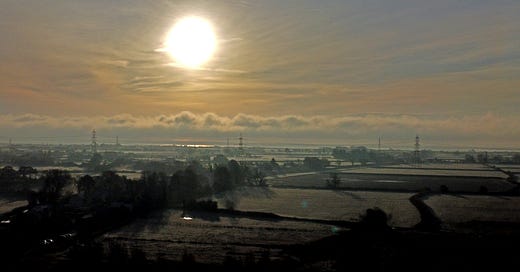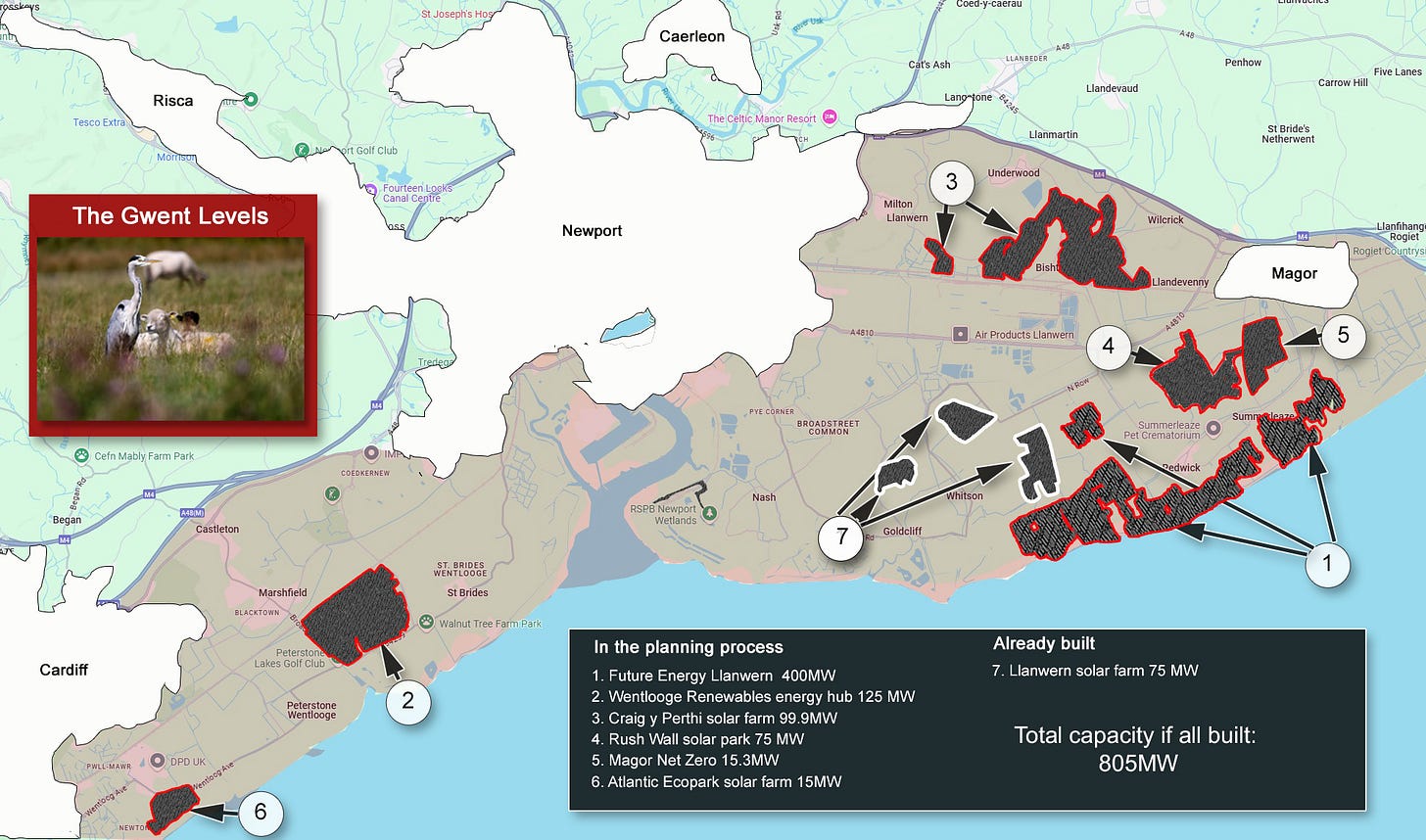The beautiful area that developers want to blanket with miles upon miles of black panels
A series of planning applications for solar farms will, cumulatively, have a devastating impact on one of Wales' most unusual landscapes - the Gwent Levels. Jonathon Hill reports
Riddled with drainage ditches, canals, hedgerows and fertile fields, while being bordered on one side by the vast tidal mudflats and wetlands at the edge of the Severn Estuary, the Gwent Levels is a landscape unlike others. It's famed for its rare vegetation, water vole, otters and birdlife. Walkers love its tranquility and remoteness.
Yet there are a series of proposals in various stages of the planning process that could transform this treasured, environmentally-important landscape into an industrial capital of a different kind - a mecca for solar power. It is the combination of sunlight and water that created the Gwent levels and developers now want to harness that sunlight for other means.
There are six applications for new solar farms in the area, which borders Cardiff to the west and Chepstow to the east. They would cover a combined 1,679 acres of land to add to the 260 acres already covered by the one solar farm already built in the area south of Llanwern. One would be the largest solar farm in the UK, generating 400MW of energy from 250,000 panels covering around 2.5 square kilometers of land.
In total, the seven solar farms either built or planned would create nearly 2,000 acres or 7.8 square kilometers of black panels soaking up the sunshine that today fosters the growth of grasses, flowers, trees and other vegetation, providing the bedrock of the ecology of the area. This is an area recognised by the Welsh Government as an ancient landscape and home to several sites of special scientific interest (SSSIs).
This map shows where all the solar farms would sit:
It is attractive to solar developers because of the ease of access to the national grid and the flat nature of the site, close to the M4 motorway. The map below shows where they would all go:
Simon Brook, chair of the Campaign for the Protection of Rural Wales and who lives on the edge of the Levels, said: “It’s a very difficult landscape to protect because the Levels is a flat landscape which has already been damaged. When you look at a place like Bishton which is literally going to be surrounded, surely these people should get free electricity
"To me the main issue here is the protection of an historic landscape and trying to preserve that landscape in its entirety. It’s not just about preserving the SSSIs and letting the rest go. If you start letting developers pick at bits of the Levels I think that’s the start of the end for the Levels as a respected landscape. I think once we as human beings start to give into this and lose interest in the landscape then we end up losing the landscape altogether.
"There are other ways of reaching net zero and we can. The capacity for rooftop solar in Newport is about 300 megawatts which is huge. I do feel it’s almost a cultural issue. If you go to France or Germany you see solar on car parks, motorways. You don’t see many innovative ways of developing solar energy in the UK.”
Areas marked for the solar farms are within a few miles of each other. Submitted applications include Wentlooge Renewable Energy Hub near St Brides which is funded by Next Energy Capital, and Rushwall Solar Park near Redwick funded by BSR Energy. Both of the applications were blocked by the Welsh Government over concerns for the landscape but those decisions were quashed following judicial reviews and applications are expected to be redetermined by Welsh planning inspectorate Planning and Environment Decisions Wales (PEDW).
The Craig y Perthi Solar Farm, funded by RWE Renewables, which would surround the village of Bishton on the Levels’ boundary, has just gone through a consultation phase after an application was submitted to the Welsh Government.
Another solar farm is planned at Atlantic Eco Park in Wentloog in Cardiff on the edge of the Levels which is funded by Dauson Environmental Group, where the planning application is at pre-submission stage and a decision is not expected until 2026. Net Zero Magor at Budweiser’s Magor site has been publicly backed by the Welsh Government and pre-submission documents were submitted in 2022. Budweiser has confirmed the project is "progressing". You can see a breakdown of the solar farm plans for the Levels so far in the box below.
All the other five applications are dwarfed by what would be the UK's largest solar farm if it goes ahead. Next Energy wants to install 400MW of solar panels south of Llanwern. This is such a large project it is beyond the Welsh Government's powers and an application would be determined by the UK Government. It is at the pre-application stage in discussions with Whitehall officials. Read more about this project here.
Six thousand people have signed Gwent Wildlife Trust’s (GWT) petition to stop significant developments on the Levels. GWT has called for a temporary moratorium on major developments across the Levels while a special planning policy is developed.
While applications are made on the basis that Wales needs to move quickly on renewable energy sources to meet climate targets, Mike Webb of GWT has spoken of the need to react to the climate emergency while protecting Wales’ ecology. “No-one is more conscious than us at GWT of the need to combat climate change. But we cannot sacrifice our nationally important wildlife in an uncoordinated dash for solar power stations everywhere and anywhere throughout Wales," he said.
These are the full details of the six applications for solar farms on the Gwent Levels:
Future Energy Llanwern
Land to the south of Llanwern Steelworks
Would be the biggest solar farm in the UK. Its 400MW capacity would to provide enough green energy to power more than 100,000 homes
Applicant is Future Energy Llanwern Ltd, funded by Next Energy Capital
Covering approximately 2.5 square km
In the pre-application process - application will be determined by the UK Government because of its size
Craig y Perthi Solar Farm
Surrounding the village of Bishton to the east and west
Erection of a solar farm comprising ground mounted, fixed position solar panels, with a combined installed generating capacity of up to 99.9 MW
Applicant is RWE Renewables, funded by RWE Renewables
334 acres, capacity to produce 99.9 megawatts
Planning application submitted and consultation period completed. The application is being examined by the Welsh Government and a decision is expected in April 2025
Rushwall Solar Park
Rushwall Lane, Redwick
The installation of a solar park with an approximate design capacity of 75MW. Development includes ancillary electrical equipment and infrastructure, access tracks, security fencing and CCTV
Applicant is Rushwall Solar Park Ltd, funded by BSR Energy
210 acres, capacity to produce 75 MW
Dismissed by the Welsh Government as potentially harmful to the landscape but decision overturned at judicial review and application expected to be redetermined by PEDW
Atlantic Eco Park Solar Farm
Newton Road, Rumney
Installation of a solar park and ancillary development
Applicant is Atlantic Eco Park Ltd, funded by Dauson Environmental Group
67 acres, capacity to produce 15 MW
Planning application at pre-submission stage
Wentlooge Renewables Energy Hub
Land on the Wentlooge Levels to the west of Hawse Lane
Erection of a renewable energy hub comprising ground mounted solar panels, battery storage units (160 units) with a combined installed generating capacity of up to 125 MW
Applicant is Wentlooge Farmers Solar Scheme Limited, funded by Next Energy Capital
318 acres, capacity to produce 125 MW
Dismissed by the Welsh Government as potentially harmful to the landscape but decision overturned at judicial review and application expected to be redetermined by PEDW
Magor Net Zero
Land south of Magor, Monmouthshire
Would power a linked green hydrogen plant to be constructed at the town's Budweiser brewery and decarbonise the brewery and its fleet of HGV delivery vehicles transporting beer around the UK
Applicant is Protium Green Solutions
Would generate approximately 15.3 MW from the 53-hectare solar farm with a 3.5MW, 105m-high wind turbine also on site. The solar farm would have 3,000 rows of 17 photovoltaic panels in eight groups. The linked electrolyser at the brewery would cover 5.3 hectares and house a 17.4 MW electrolyser and hydrogen and battery storage
Planning advice sought from Welsh Government
Developers have an obligation to offer community investment as part of plans for developments. But people who will be living beside the proposed solar panels have said they fear they won't materially benefit from them at all. While developers deny this, at the only solar farm on the Levels so far - Llanwern - all of the energy the solar panels are producing there is going to Anglian Water, which you can read about here.
John Griffiths, MS for Newport East and who chairs the Gwent Levels working group in the Senedd, has submitted a statement of opinion to the Senedd stating that the Senedd “recognises the environmental importance of the Gwent Levels to Wales with its multiple SSSIs and unique biodiversity”. He said the Senedd “expresses deep concern at the Levels coming under increasing pressure from multiple solar farm applications with the risk of detrimentally changing the nature of the Levels”.
He added: “The Gwent Levels is one of Newport and Wales’ most important assets. The unique biodiversity, wildlife and visual landscape which it affords the city and the wider area is priceless – and we must do all we can to protect it from harm and irreversible change. There is a real risk that if one of these large scale solar farms is given the go ahead, it will open the door for other similar developments, which would risk detrimentally changing the nature of the Levels and for the communities who live there.”
Peredur Owen Griffiths MS for South Wales East said: "I believe the Welsh Government should make changes to planning policy to introduce a more coherent and uniform criteria for reaching final decisions on energy developments which would include ensuring genuine community benefits and placing restrictions on large-scale developments on good quality agricultural land.”
Planning Secretary Rebecca Evans said the Welsh Government takes into consideration “the opportunities and the impacts proposed by solar developments”. She said ambition to meet climate targets “doesn’t mean we are going to abandon policies for the protection of our most valuable environments”.








This piece had me tearing what hair I’ve got left out for the totally inconsistent use of measurements of land areas. Can I suggest that you re-edit it, using acres as the principle measurement of area , perhaps offering a metric measurement in brackets , though I doubt many readers could envisage a square kilometre. The piece hardly touches on what the impact would be on the ecology of the levels if all these proposed sites were developed. I would have liked to have known if the grid has the capacity to accept all this power and what the infrastructure implications would be if it doesn’t in terms of power transmission. If lots of pylons will be needed that has huge environmental impact visually. Altogether a totally inadequate piece about a huge development.